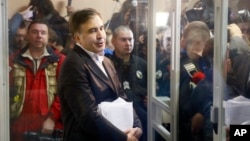Mikheil Saakashvili, the former Georgian president turned opposition leader in Ukraine, appeared in court Monday in the Ukrainian capital for a hearing on whether he should continue to be held in custody.
Saakashvili was arrested Friday on allegations that he colluded with Ukrainian businessmen tied to Russia to topple President Petro Poroshenko. Saakashvili rejected the allegations and is refusing food to protest his detention.
“I consider myself a prisoner of Ukrainian oligarchs,” he said in an apparent reference to the business background of Poroshenko, who ran a chocolate business before he was elected president.
About 200 of Saakashvili's supporters scuffled with police outside the Pechersky District court that deliberated on whether to keep him in custody.
He called for calm, saying in the courtroom that “we don't want confrontation, we don't want any sharp moves.”
Yulia Tymoshenko, a former prime minister who leads an opposition party, attended the hearing in a show of support for Saakashvili.
It was unclear when the decision on custody would come.
On Sunday, thousands of Saakashvili's supporters marched across Kiev, demanding his release and calling for Poroshenko to be impeached.
Saakashvili was a key figure in the 2003 Rose Revolution protests that drove Georgian President Eduard Shevardnadze from office. He served two terms as Georgian president in 2004-2013, winning broad acclaim for his anti-corruption efforts, but drawing criticism over a disastrous war with Russia and what his opponents saw as an authoritarian streak.
Poroshenko named him the governor of Ukraine's Odessa region in 2015, but Saakashvili resigned the following year, claiming that Poroshenko and other officials were impeding anti-corruption reforms, and became a strong critic of his former patron.
Georgia stripped Saakashvili of his citizenship after his move to Ukraine. Poroshenko this summer rescinded his Ukrainian citizenship while Saakashvili was out of the country, leaving Saakashvili stateless.
He forced his way into Ukraine in September, barging across the border with Poland with the help of a crowd of supporters.




